|
|
|
Sort Order |
|
|
|
Items / Page
|
|
|
|
|
|
|
| Srl | Item |
| 1 |
ID:
141250
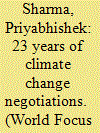

|
|
|
|
|
| Summary/Abstract |
Over the decades, climate change has emerged as an established wisdom of contemporary times. This has happened merely in the span of last three decades. Prior history of the science of climate change was full with controversy and debate. When at the turn of the nineteenth century the Swedish chemist Svante Arhenius (1896) proposed this hypothesis for the first time that man-induced carbon dioxide in the atmosphere of earth would lead to an increase in surface temperature through the greenhouse effect, not many took him seriously. To believe that the climate of earth was changing at a pace and scale far greater than the routine characteristic change forming part of the geological history of earth was too farfetched a contention at that time. For about next half a century as a result of some evidence it came generally to be agreed upon that some sort of climate change was happening but it still remained largely unclear whether this change had been happening in the direction of global cooling or that of global warming.
|
|
|
|
|
|
|
|
|
|
|
|
|
|
|
|
| 2 |
ID:
147999
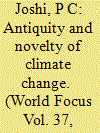

|
|
|
|
|
| Summary/Abstract |
Climate change discourse entails a very complex set of factors, policies, negotiations and diplomacy, at the same time it exemplifies a very peculiar practice of science as well. Multiple voices which are quite commonly known as the climate change negotiations have turned it into a very critical debate. The discourse is critical not because there is climate change, which after all is an eternal phenomenon responsible right from Jurassic upheavals to the pre-Holocene glaciations. It is because, this time around, there is clear cut and quite visible anthropogenic contribution to acceleration of adverse effects of climate change resulting in the warming of the earth having far reaching consequences.
|
|
|
|
|
|
|
|
|
|
|
|
|
|
|
|
| 3 |
ID:
139397


|
|
|
|
|
| Summary/Abstract |
This article sheds light on the complexity of international climate change negotiations in a federal country, like Canada, where there is no clear attribution of full power over international negotiation concerning this issue. Climate change is a multi-level and multi-stakeholder issue, one that can only be tackled successfully if all actors, at all levels of government, are involved in the process. In recent years, Canadian provinces, especially Québec, have become intensely involved in climate change paradiplomacy. That situation has led to a Canadian paradox where the Government of Québec worked to respect the Kyoto Protocol and act accordingly, while Canada opted out of the Protocol in 2011.
|
|
|
|
|
|
|
|
|
|
|
|
|
|
|
|
| 4 |
ID:
172285
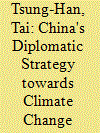

|
|
|
|
|
| Summary/Abstract |
This article investigates Beijing's new policy in its domestic implementations and international negotiations on climate change in the post-Paris Agreement era. As the 2015 Paris Agreement is an implementing agreement under the United Nations Framework Convention on Climate Change (UNFCCC), China's signature and ratification, as the country is the world's largest emitter of carbon dioxide, are critical not only to the entry into force of the Paris Agreement, but also to its exercise of obligations and influence in climate diplomacy. Reviewing China's National Policy on climate change, this article considers that China has not only planned its strategy to incorporate "global energy interconnection" in "One Belt, One Road" Initiatives a part of China's global energy reform, but also announced its 2030 Agenda as its low-carbon road map to fight climate change, both of which echo the aims of the Paris Agreement regarding "mitigation, adaptation, loss and damage, financial support, capacity-building, and technical facilitation".
|
|
|
|
|
|
|
|
|
|
|
|
|
|
|
|
| 5 |
ID:
154080
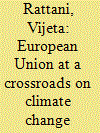

|
|
|
|
|
| Summary/Abstract |
The issue of climate change has invoked the European Union’s interests since the time the issue became a political one in early 1990s. The EU has been an active entity in formulating rules and policies to address climate change domestically and internationally too. It was a leader in the climate change issue for a decade responsible for successful ratification of the Kyoto Protocol and implementing various policies and practices. Its role however has considerably weakened post Copenhagen Summit in 2009.
|
|
|
|
|
|
|
|
|
|
|
|
|
|
|
|
| 6 |
ID:
127517
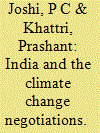

|
|
|
| 7 |
ID:
096085
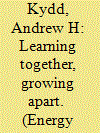

|
|
|
|
|
| Publication |
2010.
|
| Summary/Abstract |
Standard models of uncertainty in economics imply that sharing information can reduce uncertainty and help identify welfare improving policies. In international relations, "epistemic communities" of scientists are thought to help provide information for these purposes. However, conflicting preferences can frustrate the transmission of information and prevent effective information sharing. In addition, opportunities for information sharing can deepen distrust as actors observe each other's reaction to what to them is credible information. A model that assumes uncertainty both about the state of the world and the parties' motivations is applied to international climate change negotiations.
|
|
|
|
|
|
|
|
|
|
|
|
|
|
|
|
| 8 |
ID:
172318
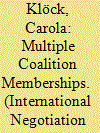

|
|
|
|
|
| Summary/Abstract |
This study explores multiple coalition memberships in multilateral negotiations, with a focus on climate negotiations. Why do countries engage in multiple coalitions, and how do multiple coalition memberships affect their influence? I argue that coalitions differ in important respects. Accordingly, countries may belong to both, long-term and short-lived coalitions; they may consciously decide to join a coalition, but also be associated by default. Finally, larger coalitions confer numerical strength, while smaller (sub-)coalitions help voice common positions. Regarding effects, I propose two perspectives. The zero-sum perspective highlights coordination costs and potentially incompatible positions, while the win-win perspective focuses on the complementarity of different coalitions and the potential for mutual support. Anecdotal evidence from the climate negotiations offers support for these perspectives, but further empirical research is needed to better understand why countries join several coalitions, how they navigate these multiple coalition memberships, and how these affect their influence.
|
|
|
|
|
|
|
|
|
|
|
|
|
|
|
|
| 9 |
ID:
138817
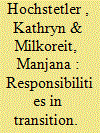

|
|
|
|
|
| Summary/Abstract |
The BASIC countries (Brazil, South Africa, India, and China) play an increasingly prominent role in global climate negotiations. Climate governance spotlights burden-sharing arrangements, asking countries to take on potentially costly actions to resolve a global problem, even as the benefits are generally indivisible public goods. This article examines the BASIC countries’ own Joint Statements and their individual and collective submissions to multilateral climate negotiations to identify the rationalist and principled arguments they have made about the climate burden-sharing requirements that developed countries, developing countries, and they themselves should face in global climate governance. It argues that their expectations for their own role are particularly unclear, with greater national action than international commitments to do so.
|
|
|
|
|
|
|
|
|
|
|
|
|
|
|
|
| 10 |
ID:
129047
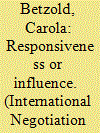

|
|
|
|
|
| Publication |
2014.
|
| Summary/Abstract |
This article analyzes the lobbying behavior of nongovernmental organizations (ngos) during international climate change negotiations.2 With limited resources, these ngos need to strategically invest their resources to maximize impact. A key decision concerns the target of lobbying efforts: Whom do ngos lobby, and why? Two possible explanations are contrasted: influence and responsiveness. Accordingly, ngos can focus on responsive targets that are likely to bring ngo input to the table or they can focus on influential targets whose voice is heard at the negotiation table. These two explanations are tested using data from a survey of ngos active in international climate change negotiations. I find that ngos strategically target their lobbying efforts, approaching both responsive and, more importantly, influential delegations. However, given that ngos primarily contact their home delegation, as well as the president of the negotiation session, further information on the nature and content of contacts between ngos and government delegations is necessary for understanding ngo-government interactions in international climate change negotiations.
|
|
|
|
|
|
|
|
|
|
|
|
|
|
|
|
|
|
|
|
|